The USCA Nationals offer an opportunity for flatwater canoeists and kayakers to set aside their differences for four days to compete in harmony at a shared venue. All races are within group, of course – there’s a limit to how much comingling can be tolerated. Like the better circuses, the Nationals are constantly on the move to stay one step ahead of the law. This year’s edition took place at Onondaga Lake State Park in Syracuse. Most famous for dissolving flesh from bone, spurring runaway tumor growth, and giving you four varieties of dysentery, the EPA recently declared the lake “mostly water” after a multi-year cleanup effort. Fortunately, we wouldn’t be paddling anywhere near ground zero of the Superfund site.
Onondaga Lake drains to the Seneca River via the half-mile Lake Outlet, the two waterways meeting at a T punctuated by a large island. Our 12.5 mile race would consist of two laps (and change), each lap consisting of a counterclockwise traversal of the T with 180 degree buoy turns at the, uh, serifs. So we’d have to negotiate a total of six left turns during the race. Since the park fronts the Outlet, spectators would be able to watch the start, half-way turn, and finish of the race. Although there were no shallows, those of us with rudders had to contend with weed beds when attempting to duck the current near shore.
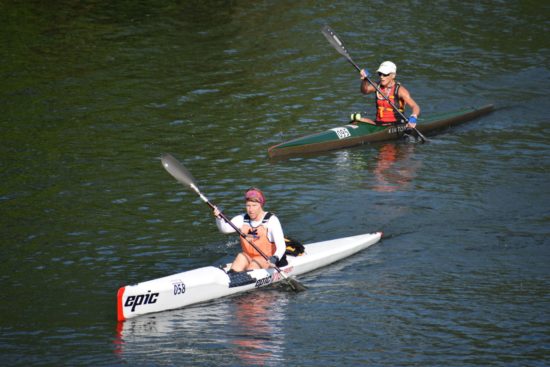
Mary Beth dueled for much of the race with Courtney Rudder, beating her by 13 seconds in the end.
On Friday, I got a chance to scout the course by proxy as Mary Beth competed in the women’s Unlimited K1 event. She had an excellent race, emerging as national champion in her age group. And, more importantly, she was able to provide valuable intel on current, weeds, and carcinogen pockets. Joann Hanowski edged out Eileen Visser as the overall winner. In men’s unlimited K2, Matt Skeels and Jim Mallory cruised to an easy victory in their ICF boat. Imagine a dignified dog of a certain age (say, 8.5) who just wants to live his life in peace. And then imagine a mischievous whelp who won’t stop playfully biting the elder dog’s ear and cracking jokes about how old he is. That’s the delightful Mallory-Skeels dynamic. Seems to work for them. In men’s touring K1 (which has apparently now expanded to include the V10 Sport), ageless Mike Herbert powered his S18S to squeak out the win. OK, at a 9 minute margin, maybe more of a roar than a squeak.
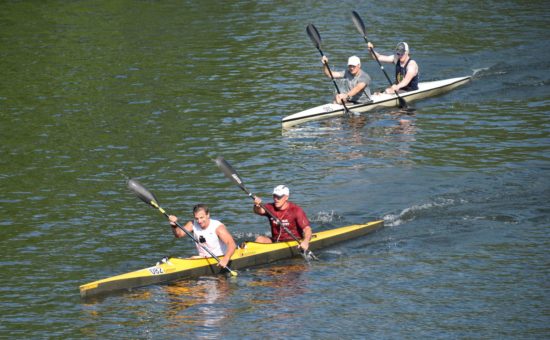
The comedy team of Jim and Matt led the Unlimited K2 race from start to finish, in no small part because they were the only team with a well-defined schtick.
Saturday’s Unlimited K1 roster was imposing, to say the least. Matt, Jim, and Mike would be racing again, of course. They’d be joined by Erik Borgnes, Craig Impens (who had competed in a C2 with his father on Friday), and Jan Lupinksi – not to mention the many unfamiliar paddlers who might also contend for the title. I’d never beaten Erik or Mike previously and had finished behind each of the others multiple times. Well, except Matt, whom I encountered just once, in his maiden open-water race. Competing against any one of these guys would redline my pre-race anxiety. At the prospect of facing them en masse, I spent most of the morning hyperventilating into a paper bag and trying to score some Xanax in the parking lot. The starting gun couldn’t come quickly enough.
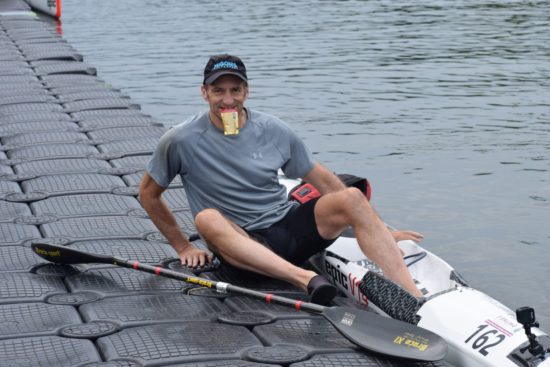
A lot of people tape their gels to the inside of the gunwale, but I prefer to sew it to my lower lip for quicker access.
After waiting for the first five heats to launch down the Outlet, it was finally time for us to maneuver into position. A quick roll call later, we were also on our way. Jan made the bold (and possibly cockamamie, given the competition) decision to seize the lead immediately, jumping a couple of boat lengths in front of the rest of the field. After several minutes, from the roiling remainder emerged a coherent order that would slowly evolve over the course of the race. Erik, Mike, and Matt were hot on Jan’s stern. Craig, Jim, Gary Wade, and Kiril Florov coalesced into a formidable chase pack. To nobody’s amazement, another cluster of paddlers separated me from that lead eight. It took me a couple of minutes to squeeze by Alan Lamb, Rowan Sampson, John Hair, and Joe White, providing myself with a clear turn at the buoy. To the great amusement of SUP paddlers at my local lake, I had spent a a good chunk of time practicing counterclockwise U-turns earlier in the week. The turns weren’t graceful or fast, but they usually ended up with me pointing in the correct direction. That is to say, upright. Despite the rehearsals, I welcomed any turn I could make during the race without interference from other boats.

Moments after the Unlimited K1 start.
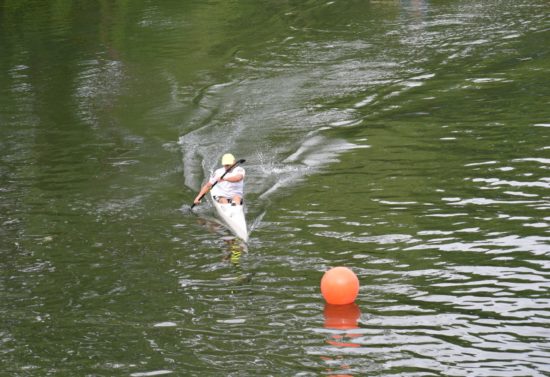
Jan shuns the company of his fellow paddlers, taking the first turn solo.
Having successfully negotiated the first turn, I took stock of the situation. A half-mile into the race and standing in 9th place (which probably explains the stability issues in those turns). I settled back into the bucket and set my sights on the next group of paddlers. A mile or so later, I pulled alongside Craig and the others. I was a little disappointed that nobody welcomed me to the neighborhood – a bottle of wine or a potted geranium would have been a nice gesture. In fact, I think they almost would have preferred that I hadn’t moved in.
Putting the C in USCA, nearly 100 single-blade boats shared the course with us. While I admire the tenacity shown in adapting to their handicap, I can’t say they made life easier for those of us blessed with a full complement of blades. Overtaking these slightly slower vessels was occasionally challenging, but the real excitement came when encountering them head-on. Since our route involved a number of out-and-back legs on the river, such meetings were inevitable – particularly at curves where paddlers traveling in both directions sought to optimize their trajectory by cutting the corners. There’s nothing quite so terrifying as rounding a bend to find yourself facing a fusillade of oncoming canoes. However, turning into the Seneca River proper, an approaching murder of canoes actually helped me by driving a wedge through our group. In the ensuing disorder, I was able to pull free. Mostly.

Craig and Jim had to be pried apart with a crowbar after the race.
While getting around the chase pack I had picked up a nasty ICF infection. As I entered the second turn, K. Florov latched onto my wash. Despite dosing him liberally with paddle water between high-power intervals, I couldn’t rid myself of the contagion. This didn’t bother me too much, however, because we were undeniably making ground on the lead pack. Over the next few minutes, their advantage shrank from 20 seconds to a point where only a single boat length stood between me and a deluxe, all-expenses-paid cruise to a top six finish. Open bar even! I patted myself on the back for having doggedly clawed back into contention. For those of you who intuitively sense a grim turn of fortune on the immediate horizon… I wish you had been on hand to temper my expectations.
I don’t know if the pack sensed our presence and upped their tempo or if I just didn’t have enough oomph left to get over the last wake, but the outcome was the same – I lingered tantalizingly close to salvation, but was unable to reach the promised land. What the leaders didn’t know was that I had a secret weapon in my stern pocket. I dispatched Kiril to bridge the gap and hopped on his draft. After struggling for a few tense moments, he was able to get over the final hump and hitch onto a wake. We had done it! And then… I watched in slow-motion horror as Kiril’s docking mechanism malfunctioned. I don’t know if he had failed to oil the reciprocating clamp or had miscalibrated the compensation gauge, but suddenly he was thrown off the draft. I briefly hoped that Kiril might be able to jury-rig a fix and re-engage with the leaders, but it soon became apparent that we were slipping further back. I pulled around my companion and attempted a push of my own, but also lacked the punch necessary to regain the draft. The struggle to join the uppermost echelon had been in vain.
As the four leaders pulled inexorably away, I considered my options. Of course, the first thing that came to mind was petulantly quitting the sport and concentrating on my second passion – competitive knitting. Upon further reflection, that seemed a little extreme given that I was, after all, still sitting in fifth place. Also, I’ve already had a few serious purling accidents. I briefly considered mounting another direct attack, but feared mutiny if my crew were so soon again commanded into action. That left me with one viable plan. Wait and hope. Although the leaders were currently colluding to freeze out everyone else, surely their foul conspiracy would eventually collapse as individual ambition trumped the common good. Perhaps I could feast on the fallen. Everybody loves a scavenger.
My strategy (such as it was) paid off much sooner than I had anticipated. Although it was difficult to make out from 20 lengths behind, it appeared that one of the leaders had dropped off the pace just prior to the third turn. As they rounded the buoy ahead, I could see that Mike Herbert had fallen behind the first three paddlers. Shortly after taking the turn myself, I was greeted with unexpected words of encouragement from fellow paddlers still headed upriver. I was truly energized to hear John, Joe, and Dave Thomas urging me on in my pursuit. John was so enthusiastic in his support that I suspected that he had a considerable amount of money riding on the race’s outcome. At each future turn he’d not only spur me on, but also provide impressively detailed information on my targets – distance, speed, bearing, food allergies, etc. Thanks, John. Hope you didn’t lose much coin on me.
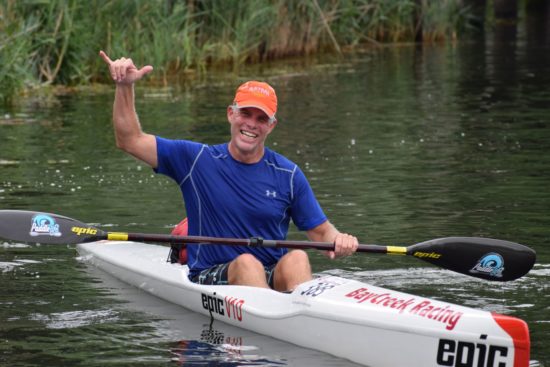
Motivational guru John Hair.
Under normal circumstances, I’d have no shot at chasing down Mike Herbert. As paddling royalty, I shouldn’t even look directly at him, let alone pass him. But apparently the previous day’s race had taken a toll. A mile after the turn, I got on Mike’s draft and followed him as he deftly threaded us through a dense formation of C1s. By the time we reached the Outlet to complete our first lap, I had the honor of pulling a former Olympian past the spectators for a once-in-a-lifetime photo op. Turning back into the Seneca River, I was eventually able to gap Mike.
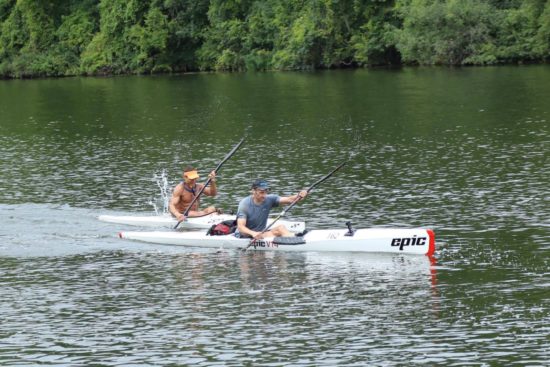
My new profile pic, desktop wallpaper, mouse pad, coffee mug, tattoo, etc. (Photo by Ashley Cary)
The splits reveal that Erik, Jan, and Matt were still together at the halfway point, about a minute ahead of me. When they reached the fifth turn, this appeared to still be the case. By the sixth and final turn, however, the triumvirate had splintered – doubtless due to some kind of back-stabbing double-cross. Erik’s power grab had him well out in front of Matt, who in turn had abandoned Jan. With John’s bloodthirsty exhortation to “hunt down the cur!” echoing over the waters, I threw myself into pursuit. Normally at this point in a race I’d have broken out the supplemental oxygen, started an IV drip, and had the defibrillator set on stand-by mode. Through some miracle combination of smart pacing, cloud-cover, and proper hydration, however, I was feeling comparatively fresh.
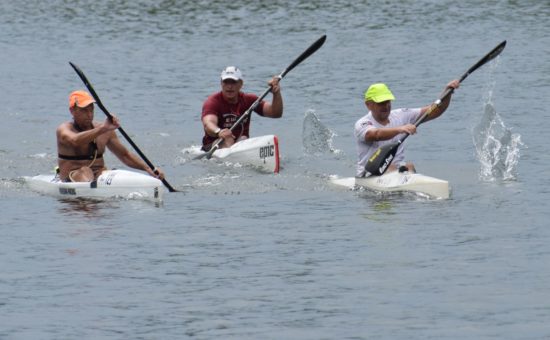
The leaders make their way up the Outlet after completing the first lap.
Uncharacteristically, Jan went down without a snarling fight. Having neglected to wear a spray skirt for his ICF, he had been working against a gradually increasing weight handicap. His ability to accelerate particularly compromised, he was unable to answer when I pulled by with a mile left. Although Erik was well out of range by this point, Matt looked susceptible. I had been closing steadily, but as we turned into the final half-mile stretch of the Outlet, he smelled the barn (or perhaps me) and increased his pace. I was able to cut another length or two off his lead, but Matt ended up 12 seconds ahead. Erik had taken gold a little over a minute earlier. Jan coasted in for a comfortable 4th place finish, with Craig just holding off Jim at the line for 5th. Kiril, Mike, Gary, and Wade rounded out the top ten. Skis took six of the top ten spots, including the entire podium.
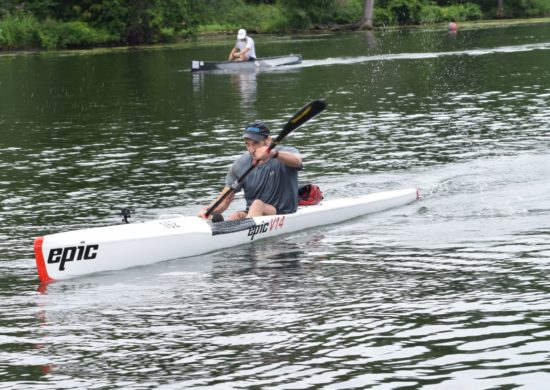
Geesh, so serious. Lighten up.
I was pleased with my performance. Despite starting from a typical self-excavated hole, I had clambered back to within just a few Skeels of a second place finish. After the race, several paddlers offered their congratulations and then complimented me for having the cadence of a hyperactive monkey. Of course, they didn’t all draw that exact analogy – I believe Gary used “deranged bumblebee”. Given that I’ve been concentrating on lowering my stroke rate while increasing power-per-stroke, I accepted these compliments with gracious dismay. But it seems to me that a high cadence isn’t inherently positive. After all, you probably wouldn’t hire me for secretarial work just because you saw that I could type 120 wsdr prer mnsute. Maybe I just need to install a strokechecker.
The Nationals provide a unique chance to race over multiple days, enjoy the company of all ilk of fellow paddlers, and – don’t underestimate the entertainment value – savor the carnage of the initial turn in any C1 race. Congrats to the NYMCRA and USCA for throwing a memorable party in Syracuse.
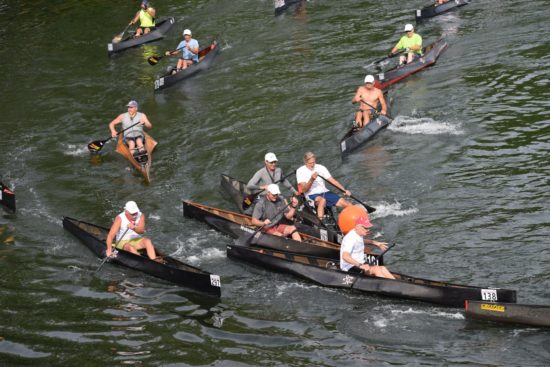
Definitely worth the price of admission.
Although I enjoyed the flatwater break, it’s back to the ocean this coming weekend for the Jamestown Double Beaver. Register at PaddleGuru. The race is at a new time and venue, so be sure to read through the details.

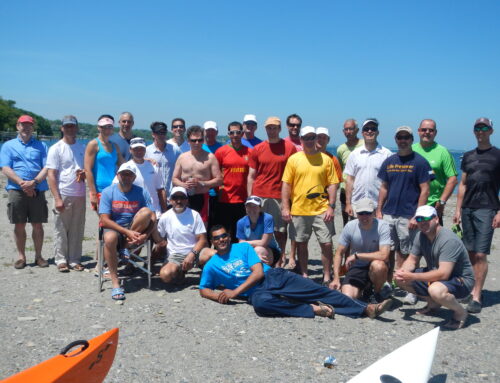
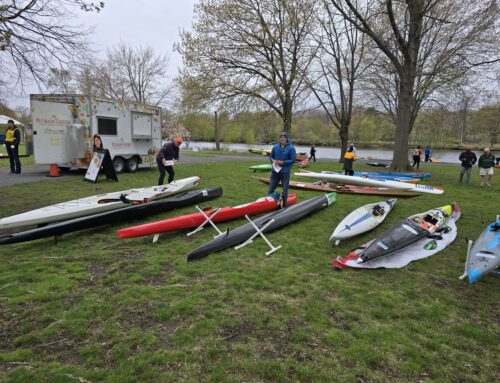
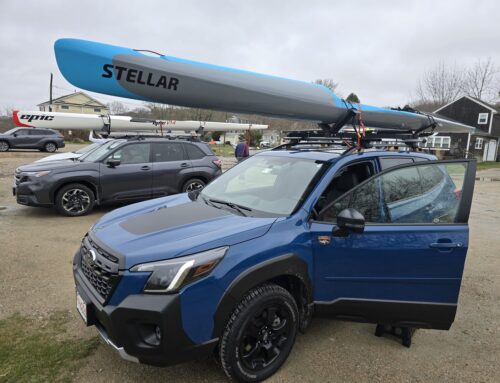
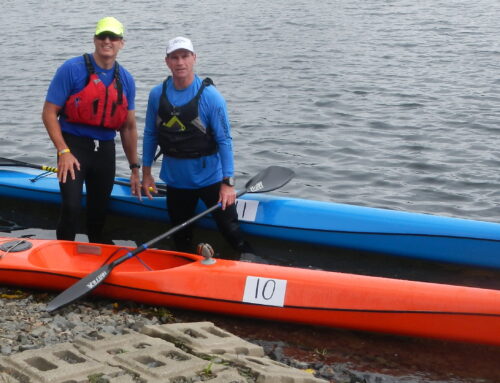
Leave A Comment
You must be logged in to post a comment.